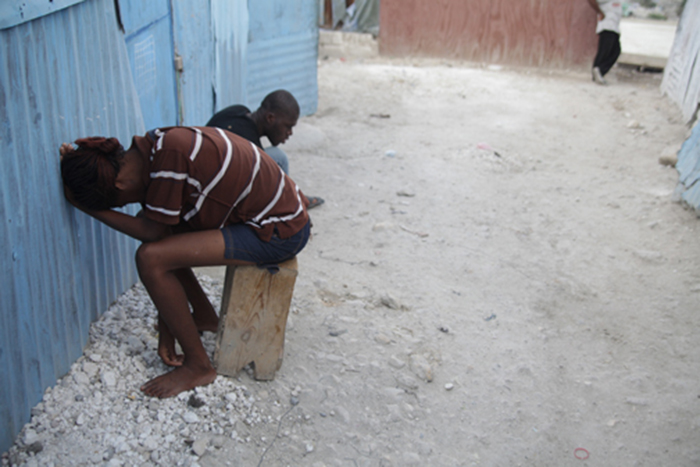
Andre Lambertson / JJIE
Haiti’s already high incidence of rape increased dramatically after the earthquake. Still, women rarely reported the attacks, and few rapists were prosecuted.
PORT AU PRINCE, Haiti — When the judge announced that Etienne Rene had been found guilty, Rene turned to Loutchama, the girl he had raped a year earlier, when she was just 12, and cursed her. He had previously been ordered by the judge not to look directly at Loutchama, as he’d been trying to intimidate her by glaring at her as she testified, but now, Rene looked at Loutchama and threatened her and her family.
“He said that he was literally going to eat us,” remembers Loutchama’s mother, Adrienne. “When you say that someone is going to eat you, it’s like they’re putting a curse on you.”
Rene was sentenced to 15 years in prison — a success in Haiti, where rape cases rarely make it to court, let alone to the point of a conviction — but it was a bittersweet victory, as Loutchama was afraid that Rene would bribe his way out of jail and follow through on his threats.
 Today, a year and a half later, Rene is still in prison, but Loutchama is dead. She most likely died from medical complications from a spinal injury she sustained during Haiti’s 2010 earthquake, which were exacerbated by the rape. But, according to Adrienne, who is now in hiding, Loutchama is dead because of Rene’s curse, and Adrienne now wishes she had not pressed charges against him. (Families of victims in this story asked that their last names be withheld.)
Today, a year and a half later, Rene is still in prison, but Loutchama is dead. She most likely died from medical complications from a spinal injury she sustained during Haiti’s 2010 earthquake, which were exacerbated by the rape. But, according to Adrienne, who is now in hiding, Loutchama is dead because of Rene’s curse, and Adrienne now wishes she had not pressed charges against him. (Families of victims in this story asked that their last names be withheld.)
“My feeling is, I lost,” says Adrienne. “The lawyers put in my mind the idea of going to court, but at the end I lost a beautiful daughter, and what did I gain with this ‘justice’? Nothing.”
Haiti’s already high incidence of rape increased dramatically after the earthquake. Still, women rarely reported the attacks, and few rapists were prosecuted. A 2012 U.N. study showed that of a sample of 62 rape complaints filed during a three-month period in 2010, only one made it to court.
Through the efforts of Haitian organizations, including the Bureau des Avocats Internationaux (BAI), Haitian lawyers who work pro bono, more rapists are now being prosecuted, and convicted. Twenty-two of the 78 cases heard during the 2011 criminal court session were for rape, and 13 of those cases resulted in convictions. In 2012, BAI brought seven cases to trial, and all resulted in convictions.
Haiti’s penal code, which is based on the French penal code established in 1810, did not change its classification of rape as an offense “against morals” to an actual crime until 2005. These convictions are therefore a success, but, the paradox is that what we in the United States might consider justice — imprisonment for the rapists — does not necessarily feel like justice for the women and girls who say that the process of investigating and prosecuting rape cases in some ways violates them a second time.
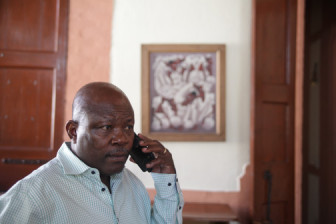
Andre Lambertson / JJIE
Attorney Mario Joseph says because of Haiti’s patriarchal society, victims often face discrimination from the very people appointed to get them justice.
The lawyers at BAI deal with many cases involving minors; these are the easiest to prosecute, in the sense that there is no question of consent. Still, there are several roadblocks along the way. The police and government-appointed prosecutors will turn victims away if they do not have a medical certificate from the general hospital, which is required to prove rape. Cases can also take over a year to be heard by a judge — some of the current cases are from 2011 — and BAI’s managing attorney, Mario Joseph, says that because of Haiti’s patriarchal society, victims often face discrimination from the very people appointed to get them justice.
“Most of the laws we have here have been made by men, and the prosecutors and judges are all men,” Joseph says. “They look for a way to accuse the women: ‘Why did you wear that dress? Why were you there at this time? Why didn’t you stay home?’ Even when you start the process it’s like you’ve lost the process.”
The Rapist Across the Fence
Loutchama’s case against Rene was a struggle from the beginning. According to her, her mother and their attorney, the nightmare started on April 30, 2011. That day, Loutchama was sitting on the patio of her house when Rene called over the fence to ask if anyone was home. During the earthquake, Loutchama’s spine had been injured when a wall collapsed on her back; she’d had surgery a few months later, and on this day was doing homework, happy to be back in school.
[Photos] Bringing Hope and a Camera to Haitian Kids
Loutchama told Rene that no one else was home; he lived in the neighborhood, and she had no reason to fear him. Then, Rene climbed the fence, tied Loutchama up, and raped her.
Loutchama told her mother about the attack when she came home, and together they walked to Rene’s house. “We saw him on the way, and when he saw us, he said, ‘Good evening, Mommy,’ as if I am his mother,” Adrienne says.
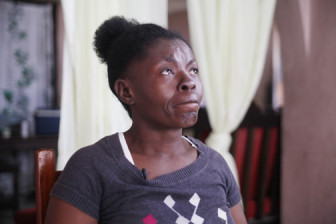
Andre Lambertson / JJIE
“My feeling is, I lost,” says Loutchama's mother, Adrienne. “The lawyers put in my mind the idea of going to court, but at the end I lost a beautiful daughter, and what did I gain with this ‘justice’? Nothing.”
Adrienne physically restrained Rene — her index finger is still bent in the place where it broke during the altercation — and told her other daughter, Tania, to get the police. Rene escaped, but the police arrested him at his home a few days later.
At the time, Adrienne was living near the BAI offices in Port au Prince, and she went there for legal assistance. She’d taken Loutchama to the general hospital, presented the medical certificate to the police, and was following the necessary steps to file charges against Rene. But, 12 days after he was arrested, the police said they were going to release Rene, because his parents had told them that if they did not, he would miss his school exams. And then, the police arrested Adrienne, as they said her 20-year-old niece had told them that she was abusing her.
Rene’s uncle was at the police station when Adrienne arrived. Adrienne said he came to her holding cell, and asked how they could arrange to release Rene.
“He was harassing me, asking what I would do to help Etienne,” says Adrienne. When the uncle started taking pictures of Adrienne with his cell phone, Adrienne told him: “Even though I am here [in jail], I am going to make this a hard case for you.”
Adrienne was released after a few days, because the judge could not find any evidence against her. Mario Joseph told the police to keep Rene in jail, as he was pursuing the case. On September 24, 2012, about a year and a half after Loutchama and Adrienne had initially filed the police report accusing him of rape, Rene was sentenced.
Haiti’s Minister of Justice, Jean Renel Sanon, says that it should take four months from the time a rape is reported for the case to make it to court, but admits that there are often delays. “I’m after the judges to apply the law and respect deadlines. It’s a problem with responsibility; there are those [judges] who could keep a case for nearly five years,” he says. “The judge is a human being and he may misstep, but we have to address that.”
Because of these delays, women will often give up on the judicial system and just try to make a deal with the rapists to get monetary compensation.
“They don’t have trust in the system, because of the slowness in getting justice,” says Eve Bruno, a lawyer at BAI. “Also, now things are changing, but before, when there was a rape, women would need the whole day to report the case to the police and the hospital, they’re losing the whole day, and say they’re street vendors, then they don’t make any money that day.”
The Sins of Her Father
Marie worked as a street vendor before the earthquake, but has not been able to work for years due to chronic illness, and now, she and her youngest daughter live in a single room with a low, crumbling ceiling and a stream of sewage trickling past their doorstep. Marie’s 14-year-old daughter, Ronaldine, lives with her cousin; Ronaldine babysits her cousin’s children and helps around the house in return for food and money to pay her school fees.
Until January 2011, Ronaldine and her sister had been living with their father. Marie had left home when Ronaldine was 6; Marie said that her husband had been physically abusive, and told her that if she tried to take the children, he would kill her, so she left her two daughters with him.
After their house collapsed during the earthquake, Ronaldine, her father and her sister moved into a wood and tarp makeshift shelter in a camp.
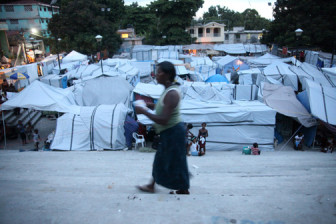
Andre Lambertson / JJIE
After their house collapsed during the earthquake, Ronaldine, her father and her sister moved into a wood and tarp makeshift shelter in a camp.
According to Ronaldine’s medical certificate, in December 2010, she was raped by her father three times over the course of three nights. Ronaldine said he came to her in the middle of the night. She tried to fight him, but her father punched, hit and eventually subdued her. When Marie visited her daughters on Christmas Eve, Ronaldine told her what had happened. Neighbors who had heard Ronaldine’s screams confirmed her story. On December 28, Marie took Ronaldine to the hospital to be examined, and to get a medical certificate. Over the course of the next month, she went to the police, to the prosecutor’s office, and through the various other complicated steps required to prosecute her husband.
People tried to dissuade her from pursuing the case. “My husband’s cousin said, ‘Don’t arrest him, because if you do, you will cause problems for your children. They will be in misery because no one will take care of them,’” says Marie.
Though Marie had no source of income and was living on the porch of someone’s house, she still decided to file charges against Ronaldine’s father, and he was arrested on January 31, 2011. When the police called to tell Marie, she collapsed. “The process was so long, and when it finally happened, I was in shock,” she says.
She had also had a change of heart about prosecuting him. Marie was already beginning to feel the financial strain of having to support her children, borrowing money from family, just so they could eat. So, when her husband’s cousin had again offered monetary compensation, she had considered the proposal, but the case was already in the hands of court, and it was too late to turn back.
In the summer of 2012, Ronaldine’s father was sentenced to life in prison. Ronaldine, with her heart-shaped face and soft yet determined voice, says that she is glad her father is in prison. “He was not a good father, and I never liked him,” she says. “I wanted to go to court so that he would be put in jail for what he did.”
Marie has misgivings and says that, in retrospect, she would rather have received money from her husband instead of pressing charges against him.
“I am sick, I have no job and I can never get money from him ever again, because he is in jail for the rest of his life,” she says. “So, I have to make it on my own.”
Bruno says that in Haiti, rapists are typically tried through both the civil and criminal courts. If convicted, they can be ordered to pay a fine, but in cases where the rapist is poor, there is no point in pursuing a civil case, as he won’t have money to pay the victim. Poverty also plays a role in the speed the cases are heard, and the outcome. The process of filing a report at the prosecutor’s office and serving warrants is handled by the state, and therefore technically free, but some lawyers say that many court officials, for instance, the huissiers, who serve the warrants, expect to be paid. Those with money can pay to have warrants served expeditiously, therefore guaranteeing them swifter justice.
Though Sanon, the Minister of Justice, acknowledges that affluent Haitians can pay for lawyers to represent them, he denies that poverty has any impact on the judicial system itself: “I don’t want to say that there is an imbalance between the justice of the rich and the poor, that is not the problem,” he says.
In Poverty and Injustice
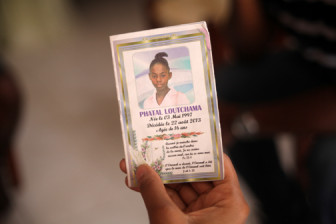
Andre Lambertson / JJIE
Today, a year and a half later, Rene is still in prison, but Loutchama is dead. She most likely died from medical complications from a spinal injury she sustained during Haiti’s 2010 earthquake, which were exacerbated by the rape. Pictured is a booklet made for Loutchama's funeral.
Loutchama died on August 26, 2013. That week, Adrienne began receiving strange calls from a number she now has stored in her phone under “Zombi.” When she answered, the person on the other end would make the sounds of a donkey or a goat.
A few days before she died, Loutchama complained of a stomachache and shortness of breath. Adrienne took her to the hospital. The doctors thought perhaps there was an issue with Loutchama’s lungs, but without a pulmonary specialist to do the necessary tests, all they could do was give Loutchama some pain medication and send her home. Loutchama collapsed at around 7 that evening, while Adrienne was out buying fruits to make some juice for her, and died in the corner of the living room.
Adrienne has not been back to her home since, and is afraid that Rene will kill her, either through the curse, or in person. “My concern is that Loutchama has died and I heard that [the people at the prison] were waiting for Loutchama to die to release the rapist,” she says.
Though she too has regrets about having pressed charges against her daughter’s rapist, unlike Marie, Adrienne says she was never interested in monetary compensation. “When I was in court, I said to the judge, ‘I have a hole inside of myself; there’s no money from Etienne’s family that could fill, or hide, that hole that I have. No money,” she says. “And when Etienne’s lawyer said, ‘What do you want?’ I said, ‘Etienne needs to go to jail. Justice must take its path.’”
At the time, Loutchama herself had grown tired of having to tell the story of the rape over and over again, to the police, doctors, lawyers, the judge. “If they would have stopped talking to me about it, that would have been the best,” she said, in a March 2013 interview, “because every time they were talking about [the rape] I was thinking about it.” But Adrienne says she was fired up by the BAI lawyers’ talk of human rights — it was the first time she had heard of such a thing, and she was determined to get justice for her child. Now, she says she knows her efforts were always in vain, because in Haiti, human rights do not apply to people like her.
“I’m poor,” she says, “and I will never have justice.”
Reporting for this article was funded in part through a grant provided by the Reporting Award from New York University's Arthur L. Clark Journalism Institute.
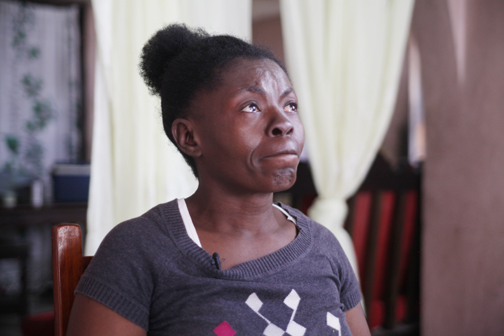
Pingback: In Haiti, seeking justice for a neighbor’s rape of a 12-year-old, and why rape cases here rarely make it to court | ChildreninShadow.wordpress.com